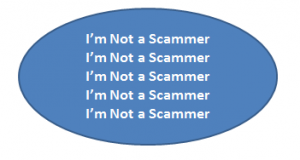As many of you know, for the past several years I’ve been railing against the seminar industry and begging for some self-policing. The shame is that the industry is getting worse and worse. Up and coming speakers see how the established scammers operate and think the fraudulent techniques they are seeing are the ways things should be.
In a very popular past article https://www.antion.com/top20seminarscams.htm I showed you many of the techniques seminar scammers use to defraud you and your friends. In this posting I’m going to show you the science behind the techniques.
It’s an Illusion
Before I begin, let me address the principle of “Illusion of Invulnerability. In layman’s terms it’s the concept of “It will never happen to me.” This principle is prevalent in our educated, ego driven society. It means that since we never believe bad things will happen to us, we never take steps to protect ourselves.
- “I’ll never get mugged, so why should I study self-defense.”
- “I’ll never forget my house keys, so why should I hide one out in the yard (just happened to me last night after living here 12 years.)”
- “I’ll never get cancer, so why should I quit eating toxic foods”, etc.
It’s the same thing with seminar scams. “I’m too smart to get sucked in by one of those slick talking pitchmen/women.”
A famous conman once said, “If you think you can’t get scammed, . . . . I want to meet you.”
Let’s say you are too smart to get robbed by a sociopathic seminar speaker. Are your friends that are going to a seminar smart enough to keep from getting fleeced? At least pass this information on to them to heighten their awareness. They’ll thank you for it.
Oh, and one more thing about being too smart and business savvy, — according to a report by (FINRA) the Financial Industry Regulatory Authority Foundation, investment fraud victims had more education, earned more and were more financially literate than the general population. “Many of the victim lists look like a ‘who’s who of American Business”.
Same Old, Same Old
In interviews with many convicted scammers certain underlying principles are almost certain to appear. Many of these techniques have been used for centuries to rob people.
- A heightened emotional state — AKA “ether”
- Phantom Riches
- Source Credibility
- Social Consensus
- Urgency / Scarcity
- Good Deal
- I’m your friend.
The Most Important Scammer Tool
“Under the ether” is slang used by con artists to describe a heightened emotional state of their victims. The con artist / scam seminar speaker wants you under the ether the entire time they are dealing with you because they are absolutely sure you will not be able to make great decisions for yourself when in this high level emotional state.
I don’t know for sure, but there are a couple ideas I have on how they started using this term. 1. When you are under ether (the chemical) you are unconscious which means they can take your money and you don’t even know what’s going on, or 2. Ether is also used to describe the sky as in “All your money is going off to the ether.”
Emotions cause us to turn off our normal internal warning signs. We all know the phrase, “If it sounds too good to be true, it probably is.” Can you really use that phrase to your advantage when music is blasting, people are clapping, people are running to the back of the room, and a fiery motivational speaker is pushing every emotional button you have and many you didn’t even know you have?
Music, dancing, chanting, back massages, celebrities, packed in crowds, fake or real testimonials and many other techniques are used at seminars to get you in the “ether”. Sometimes it’s opposite in that profound and mind numbing silence and meditation is used to get you in the ether. Either way loud or not, it’s going to be bad for your decision making abilities and the scammers know this.
In a study done by Joseph LeDoux, a neuroscientist and Professor of neuroscience and psychology at NYU, he discovered what he calls the “low road” (I think aptly named because scumbag speakers chose to take it). This “low road” is a direct path to the emotional parts of the brain. Information on this road travels twice as fast as information going to the rational part of the brain. It’s a scammer’s job to overload this road with emotional stimuli thus effectively “hijacking” the rational part of the brain. This is why people who are considered very rational can act in very irrational ways when their emotional buttons are pushed.
The Phantom of the Seminar
Instead of, as in the play, a disfigured musical genius being obsessed with a beautiful girl, the slick talking, finely dressed speaker is obsessed with your wallet. One of the extremely powerful techniques they use is “Phantom Riches”.
When you are told you can have something that’s normally unattainable (phantom) you would think the old saying about “if it’s too good to be true” would kick in. It won’t kick in if the scammer has done a good job of getting you “under the ether” as I discussed above.
The next part of sucking you in deeper is to tell you about all the great money you could make. One female speaker I distanced myself from many years ago was on stage saying matter-of-factly things like “a 30% return on your money is no problem at all.” A few years later I saw her and she had reduced it to 15%. Most recently I heard she had over 200 lawsuits against her. I guess a few of those people that gave her money didn’t quite see their 30% returns.
Another loudmouth punk who’s made deals with the devil(s) (the devils I’m referring to are other scammer speakers and Internet marketers) was reciting figures like this. “All you have to do is sell 500 of product X for $197.00 each and out of those buyers sell a coaching program to 100 of them for $5000.00 each and you’ve made nearly $600,000.00 for the year.
Are you kidding me? Are you aware of the abilities, reach, and expertise it would take to accomplish such a feat? He made it sound like just by buying his stupid videos and talking to his $2.00 an hour coaches you would be immediately able to do this. That’s just one of the reasons he’s high on my scammers list.
It’s Incredible How Credible I Am
Another of the absolute musts in a seminar scammer’s box of tricks is to make a big fuss of how credible they are. In fact almost all the scammers I know spend the bulk of their time trying to prove how credible they are rather than “actually being credible” by servicing their customers.
There are various ways they do this.
- They pay large amounts of money to get in a position where they can get their picture taken with an “A” list celebrity. They then plaster these pictures everywhere potential victims can see them.
- They have celebrities appear at their events.
- Using their charisma, false promises and peer pressure they force situations where people give testimonials (preferably on video) while in the ether and BEFORE they have been fleeced. Again they put these testimonials everywhere possible.
- They tie themselves to credible charities who don’t really know how to vet their donors. Sometimes the charities get the donations and sometimes they don’t. By the time anyone finds about the chicanery, the charity’s name has been used to rob new victims.
- They dupe the media into featuring them knowing that guests are not usually fully vetted because of time constraints.
- They flood the Internet with fake websites, blog mentions etc. claiming the scammer speaker is NOT a scammer.

Scammers spend most of their time trying to convince you they are NOT scammers.
The problem with this section is that there’s absolutely nothing wrong with getting your picture taken with celebrities, having them at your events and getting lots of testimonials and media attention. Where this crosses the line is when the only reason you do these things is to use fake credibility and fake Internet mentions to rob unsuspecting victims.
Keeping Up With the Joneses
By falling in to the trap of following everyone else rather than making your own rational and well thought out decisions at a seminar is more like keeping up with the Rev. Jim Jones’ People’s Temple suicide cult. I.e. your money will be lost along with everyone else’s.
We saw above how scammers use celebrities to build their credibility. The con artist also knows that if you see or hear about someone else “just like you” that has had success investing in the speaker’s training program you will be more likely to invest. That’s why you see an endless parade of regular people saying great things about the speaker.
Can you believe what these supposedly regular people say? Maybe or maybe not. One of the major networks did an undercover sting on infomercials where they found for as little as $50.00 they could get an out of work actor to say anything they wanted about a product that didn’t even exist. For as little as $5000.00 they got the chief dermatologist at a world renowned hospital to say a product was great when it wasn’t and they caught her on camera doing so. How she is still practicing is beyond me.
Remember, in the seminar world many of the testimonials were recorded while people were “under the ether” and before they were robbed. Couple that with stooges in the audience who were either paid or given more access to the speaker in exchange for their glowing tales of success. These tales may be espoused publicly in the middle of the event, or even more insidiously, while at lunch or even in the bathroom during breaks.
Buy Now or Be Sorry Forever
Another of the traits of almost all scams is the push to get you to decide quickly. This provides several advantages to the scammer. The first being they won’t have to waste time answering your questions and being nice to you during the seminar if you aren’t going to buy anyway. If you just walk away and get out of the room or go to lunch, that suits them just fine because they don’t have to take time away from potential victims.
The second reason is “Buyers aren’t readers and readers aren’t buyers.” According to the interview done by the AARP sanctioned book “Outsmarting the Scam Artists” by Doug Shadel the saying was coined by Johnny Weber (may not be his real name) a convicted scammer serving a ten year prison term. Johnny knew that the best prospects to scam were the ones who hurriedly signed on the dotted line without actually reading the agreement or asking a lot of questions.
To cover their fraudulent asses most seminar scammer agreements do say many of the things that are against your best interest. The scammers employ scumbag attorneys to draft these agreements and write them in such a way that it would take careful reading and probably a consultation with your attorney to actually understand what they say.
The scammers know that if they can get you to sign immediately before you really read the agreement, they have a great chance to take your money.
To create this urgent need to sign now, you’ll see and hear things like:
- “I’m flying out right after my talk so this deal is only good for 30 minutes after I’m done.”
- “I can only take the first 20 people at this price because I have to reserve time to take care of my full price clients.”
- “There are only 10 slots left”
- “This is a seminar only price. Once you leave here it’s $3000.00 more.”
Let’s Make a Deal
Another ploy that’s always used is that what is being offered is the best deal in the world and you’d be crazy to pass it up. It’s become the norm at a live event or webinar to provide heavily discounted products. You’ll see things like:
A $27,500.00 value
You pay only $1997.00
When showing this deal the scammer will go over a ton of items included in the deal all the while showing the “inflated” values of these items. Frequently these items are doubletalk and sound way better than they are. I actually burst out laughing when I heard one female scammer out of Canada say, “You get unlimited one-on-on coaching with me via teleseminar. (a $5000.00 value) ” . . . WHAT?
Wait a minute! Let’s break this down. First of all if you are on a teleseminar, that is not one-on-one coaching. Secondly, teleseminars only occur once a week or once a month which is certainly not “unlimited”. This doubletalk was totally designed to make you think you were getting one-on-one coaching with her when in fact there was ZERO one-on-one coaching.
You also hear things like, “This program has never been offered at this low of a price and never will be again.” Of course, next week the speaker will say the same thing at another event.
Karma Chameleon
Sociopathic seminar speakers are chameleon-like in their actions. They are your friend . . . at least until they get your money. A prominent psychiatrist on my anti-scam team told me, “These speakers are “grooming” the audience for the financial kill.”
If the speaker needs to act friendly to you to get your money, that’s what he does. If she sees you are star struck, then she’ll play the diva and make you feel honored to be around her. If he can tell you love humor, he’ll joke around with you and if he sees you’re all business, he’ll parade big, fraudulent numbers in front of you to get you to sign.

You’d be lucky if the fraudulent speaker you run in to is only two faced.
I.e. he or she will do or say anything true or not to take your money. I recall one victim statement where the scumbag speaker praised the ideas of two sisters who wanted to start a business. As soon as he got their money he dissed them and said their ideas were stupid and would never work. . . . They had to file bankruptcy and default on the credit card they used to pay him.
In an interview, Culture Club front man Boy George explained: “The song Karma Chameleon is about trying to suck up to everybody. Basically, if you aren’t true, if you don’t act like you feel, then you get Karma-justice, that’s nature’s way of paying you back.”
I wonder if that had anything to do with his long time public heroin addiction denials and his 15 month prison sentence for falsely imprisoning a male escort and beating him with a chain.
Anyway a chain beating would be too good for many of these predators that “up until now” have been flying under the radar.
You Can Taste the Difference
Circa 1984 Pepsi Cola Company started using the ad slogan “Taste the Difference” Prior to this circa 1975 they started the Pepsi challenge where they gave people a sip of unlabeled Pepsi and Coke to see which one they liked better. Even though the challenge faced many challengers that cried foul in how the challenge was orchestrated, it still brings up a good point. Similar products can have significant differences. For instance:
Many speakers give you a special deal at live seminars. . . Fraudulent speakers lie about the value and exclusivity of the deal. Honest speakers don’t.
Many speakers get you to buy at the event. There’s nothing inherently wrong with that . . . Fraudulent speakers do it so you can’t slip out of the ether and rationally analyze what you are buying which is probably bad. Honest speakers allow you to fully review what you are getting.
Many speakers use testimonials in their speeches. Fraudulent speakers use fake or misleading ones and a bunch of celebrity pictures to create false credibility. Honest speakers don’t.
Many speakers show potential income. Fraudulent speakers out and out lie about results or paint pictures of great riches only attainable by one in a million. Honest speakers give true pictures of the work and time needed to achieve good results and they don’t hype these figures.
Many speakers are willing to give you an evaluation of your ideas before you sign up with them. Fraudulent speakers will say anything to puff you up to get your money. Honest speakers will tell you their true thoughts even if it keeps you from signing up for their program.
Address the Objections
Any good salesperson will tell you that you must bring up objections before the prospect does. This keeps the salesperson from having to back-pedal and look guilty when someone brings up something negative. Certainly this is a time tested technique in the sales process. Bring up your weaknesses before they do and you look totally honest and transparent . . . but are you really?
I hate to be the one to tell you. . . . The scammers know about this technique too.
You’ve got convicted felons out their running events and speaking. You’ve got people who’ve had their assets frozen by the government because of their deceptive business practices out there speaking. You’ve even got people that have killed participants in their seminars out there speaking. They all have their carefully crafted stories to overcome these seemingly insurmountable bad marks on their records (objections).
The sad part is. . . . many people believe their horsepucky stories and continue to get robbed over and over. Con artists call this “loading” or “reloading”. They know absolutely that a person suckered once is not wiser but is the most likely person to get suckered again. One of the reasons is explained below.
Robert Cialdini in his classic book “Influence: The Psychology of Persuasion” talks about commitment and consistency. He relates story after story of how once someone makes a decision, even if it was bad or not at all what was promised or they expected, they defend it. He calls this “self-delusion”. Not only is it bad for the person that got taken advantage of to do this, it’s bad for future victims. Had this person stood up and complained they wouldn’t have been robbed again and others would have had fair warning about the scammer.
You’ll hear statements from scammers like:
- “Other speakers are jealous of my success and are spreading false rumors.”
- “The Government needed a scapegoat and I was it.”
Here’s my favorite which I’ve heard from at least three major scammers:
- “My partner did some very bad things and I was left holding the bag.”
How Can You Protect Your Friends?
Since we know you and I are far too smart to be fleeced hahaha what are some of the things our friends and colleagues must realize and do to keep from getting robbed?
First let’s recall some of the proven characteristics of people that have been victims of financial scams, i.e. where money was invested for some kind of return:
Compared to the general population victims have:
- A higher level of education
- Higher incomes
- Better financial literacy, and
Many victims are older which makes sense because being older gives you more time to accumulate money, credit and other assets that can be stolen.
Let’s look at the some cumulative results of studies about financial fraud victims. These studies compared the behavior characteristics of people that have been conned to behavior characteristics of the general population as reported in the Doug Shadel AARP book.
Victims allow themselves to be exposed to more sales messages. At home this might be staying on the phone with a cold caller rather than hanging up or reading all your junk mail. It might mean going to a “Free Lunch” put on by a financial planner. In the seminar world it would be attending more seminars where sales pitches are made.
Victims showed more interest in persuasive statements rather than immediately dismissing them as horsepucky. Statements like “You’ll make more money.”, “I’ve got thousands of happy customers.”, “Celebrities love me.”, “I only have ten slots left.”, “This is the best deal I’ve ever offered, “ etc., are all examples of persuasive statements. Whether they are true or not or whether it really matters to your success or not. . . well, that’s another story.
Victims don’t take steps to protect themselves. How many people “thoroughly” check out the speakers and promoters at seminars they attend? I contend not very many or I wouldn’t have to be doing my anti scam work. Also, I emphasize the word “thoroughly” because scammers flood the Internet with false positives and glowing testimonials about themselves knowing victims won’t dig deep enough to find the real dirt. Combine this with the “invincible factor” mentioned above and you’ve got a recipe for disappointment and financial disaster.
Victims are risk takers. . . . Nothing ventured / nothing gained types. This is another one of the problems that’s tough to overcome because it can be a healthy attitude if approached judiciously. When it’s used to manipulate you into making unwise purchases based on false promises and deceit, it can ruin you financially.
Victims have low financial self-control. A joint study by Kristy Holtfreter, Michael D. Reisig (Florida State University) & Travis C. Pratt (Washington State University) for “Criminology” https://onlinelibrary.wiley.com/toc/17459125/2008/46/1 showed that certain behavioral activities correlated highly with fraud victims. Admittedly this study is six years old, when remote ordering of products was not as prevalent as it is today, but some of its findings are rather telling. They found that two forms of remote ordering . . . from phone solicitation and from infomercials resulted in a 61% increase in the chances of being targeted by scammers. The other thing that jumped out at me was that by adding only one additional risk factor on their scale increased your chances of falling prey to a fraud by 302%.
Awareness
Just by reading this and my companion article “The Top 20 Seminar Scams” https://www.antion.com/top20seminarscams.htm you and your colleagues will have a much greater chance of avoiding becoming a victim at a seminar.
The problem is as our friend Johnny Weber said above, “Buyers aren’t readers and readers aren’t buyers”. You have partially passed the seminar safety test because if you read this far, you are far more aware of the kinds of psychological and NLP type techniques that can be and are used against you in many seminars. If you take the time to read the companion “Top 20” article you could become a General in my Scam Brigade against sociopathic, criminal speakers.
What about your friends and colleagues? Are they readers? If not, they have a rude awakening in store for them unless you do them a favor and give them a synopsis of what you’ve learned about here.
Send them links. Offer to talk to them on the phone, or on Skype to discuss a plan to stay financially safe at any seminar they are planning to attend. I advise people to print out my “Top 20” article and take it with them to a seminar. I frequently get reports back that almost every scam on my list was used by one speaker or another at multispeaker events.
Conclusion
It’s getting harder and harder to find speakers who are totally legitimate. Besides the industry simply being flooded with bad apples, regular speakers are being pressured into questionable behavior just to stay alive.
Promoters of events expect a large amount of money to come from prime time slots at their seminars because they get a large percentage of the sales. What I’ve seen over the years is that speakers are telling bigger and bigger lies from stage so they can sell more than the scammer who spoke just before them.
It can be even worse when the promoter is also the main speaker. That “person” (and I use that term loosely) has total control of the entire event. If the speaker is a cunning rip-off, this is an extremely dangerous situation for you and your colleagues. There is absolutely no interest at all in serving and helping the audience members. The event is orchestrated like a sick play to rob as many people as possible.
This is when the entire fraudulent parade is unleashed. Fake “Marketer of the Year” sideshows, fake application processes, paid celebrity endorsements, stooges and just about every other technique you see in my article https://www.antion.com/top20seminarscams.htm are used to keep you in the “ether” and take your money.
I’ll be the first to admit that even the worst scumbag speaker has some good information to impart. Many of these speakers are very smart. They’ve just chosen to use their skills in a negative way. They use the limited good information they give you to lure you into paying for inflated “Phantom Training” they’re NEVER going to give you.
Slick onstage personas can make a piece of dog poop look like the most important dog poop you will encounter in your entire business career.. The bad ones all manipulate your emotional state (ether). They dangle big money in front of your face with little work (Phantom Riches). They look great with celebrity endorsements, (dubious) testimonials, and deals of a lifetime. It all has to happen for you right that minute or to them you are the dumbest loser ever to be let out of your house without a chaperone.
Don’t let yourself or someone you know become the next highly educated, high income, financially literate victim of professional level onstage con artists.
Please leave your comments below.
Related Items:
https://tomantionwebinars.com/– The first webinar is on the sociopathic mind of scam speakers
https://www.antion.com/top20seminarscams.htm – A listing and explanation of the exact techniques used to rob people at seminars (print it out and take it with you to your next seminar)






















